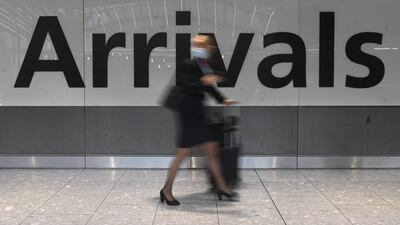More than 300,000 people may have broken quarantine rules in England and Northern Ireland in the space of just three months, figures show.
Under England's traffic light system for travel, people arriving from so-called amber list countries must self-isolate for up to 11 days to stop the spread of potentially deadly Covid-19 variants.
However, figures released after a Freedom of Information request suggest that up to a third of people from amber list countries during the period of March 17 until May 31 may have avoided self-isolation entirely.
It comes as the government faces a legal challenge over its quarantine policy for arrivals from red list countries, which requires people to pay £2,285 ($3,160) to stay in a government-mandated hotel, even if they are fully vaccinated.
Regarding amber list travellers, up to 301,076 cases were referred to Border Force investigators for checks on whether they complied with the legally-binding requirement to self-isolate, according to a report by the BBC.
Call handlers at the Department of Health and Social Care have been tasked with contacting every person who arrives in the country from restricted countries.
If a call is cut off or if the person is believed to be non-compliant, then the call handler will refer the case to the Border Force Criminal Justice Unit, which would attempt to send officers to that person's home.
However, it is unclear whether agents working on behalf of the Border Force were able to visit every person referred to them by the health department.
More than a million people arrived in England and Northern Ireland from amber list countries from March to May 2021, just as the UK was struggling to contain the outbreak of the deadly delta variant of Covid-19.
A government representative said: “The Home Office looks to visit all individuals referred to us by NHS Test and Trace who are required to isolate at home following international travel.
“We visit over 99 per cent of the cases referred to this service by NHS Test and Trace."
'Outrageous' UK traffic light system faces axe
Boris Johnson is expected on Tuesday to outline a new strategy to deal with coronavirus for winter and autumn, with speculation mounting he will rule out future lockdowns and scrap the traffic light system for travel, and instead put a greater emphasis on vaccine booster shots.
Lawyers at London-based PGMBM have previously sought a judicial review of the English government's Covid-19 regulations which require travellers coming from a red list country to spend 11 nights in a quarantine hotel.
This rule is applicable for everyone, even if they are fully vaccinated and test negative for Covid.
managing partner at PGMBM
PGMBM said a blanket approach was an “unlawful deprivation of liberty” for those who were inoculated against Covid-19, and a violation of their human rights.
There are currently 62 locations on the red list, including Mexico, Tunisia, Turkey, and much of South America and Africa.
Tom Godhead, managing partner at PGMBM, said: “It’s disappointing that the government hasn’t yet realised that this policy is a fundamental breach of people’s human rights. Law abiding citizens who have been double vaccinated should be free from quarantine.
“The idea that they need to pay for the privilege of their own imprisonment is outrageous.”
PGMBM have asked people who were made to stay in hotel quarantine to register their details if they are interested in joining the claim.
“The people that are contacting us for help every day are not reckless globetrotters. They are typically people who have been forced to travel to care for relatives or attend funerals of their parents or siblings,” Mr Goodhead said.
“To then force them into what the mass media have described as ‘worse than a prison’ is not only reprehensible but also unlawful.”


